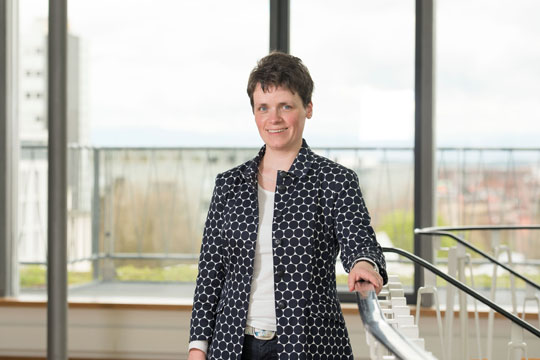Speeding Up Diversity
Freiburg, Apr 28, 2020
Since the coronavirus crisis, virtually nothing is like it was before, and that can be a good thing. “We’ve had to change our ideas about work and do it fast,” says Dr. Aniela Knoblich. She points out how quickly flexibility has become a part of the University of Freiburg. Knoblich, who is head of the Gender and Diversity Office at the University, recently published an article about the changes that have occurred because of the pandemic and how they affect the way we deal with diversity. She talked to Rimma Gerenstein about the potential of new ways of working, studying, and communicating, and what could become permanent after the crisis.
 Charts, coffee, cat: Working at home is different than in the office.
Charts, coffee, cat: Working at home is different than in the office.
Photo: agcreativelab/stock.adobe.com
Dr. Knoblich, since the Covid-19 crisis started, the University of Freiburg has been experiencing a rapid succession of major changes. Normally, changes take longer at an institution with such a rich tradition. Do you feel the tectonic shift?
Aniela Knoblich: Yes, of course. I think everyone feels it. We all had to respond very quickly. We had to change things that we used to think would never change – and certainly not so quickly.
Like what, for example?
The way we work. In my case, I couldn’t go to my office from one day to the next because I’d been in Alsace a few days before. I was told to quarantine myself at home for two weeks. Then, almost everyone started working from home after stricter regulations were enforced. At the University, we used to think that working from home was mainly an option for people who wanted to balance family and career – in other words, it was a kind of goodwill gesture by the employer. I always had the impression that people thought telework wasn’t entirely trustworthy. Were those employees really working hard at home? Then practically overnight, it became the most common way for the majority of us to work.
So people have had to change their ideas about work?
Exactly. It brought a kind of flexibility that only a few people had been able to achieve before. Now everyone can be much more flexible, and they have to be. When you work at home, you don’t necessary do things exactly the same way as in the office. Maybe you work at different times, or you have to watch the kids, or you take different kinds of breaks. This means you have diversity in your work life – and perhaps your perspective on your work at the University is changing. What is important right now? What will be important later? How can I do the task at hand well under these different circumstances? Diversity thrives on a change in perspective.
A change in perspective means that I see another person as different from myself. That perhaps other things are more important to the other person.
Exactly. If we take this a little further: I can realize that the other person’s value system is just as legitimate as mine. Or going even further: I can realize that I can respond with appropriate behavior and respect, and that I can learn from this perhaps. To be more specific: We know that not all employees are able to fit the common work model – for example, due to illness. But this doesn’t say anything about someone’s performance. Sitting at your desk in the office doesn’t equal performance. Being able to recognize this contradiction is part of diversity skills. Especially now in the coronavirus crisis, we have to learn how to live with quite a few contradictions.
Could you say a little more about that?
In our everyday conversations, we notice that people are feeling a lot of fear, insecurity, and worry about the future of their jobs, their health, and their financial situation. Yet, at the same time, we can see many new opportunities. People are all of a sudden saying, “I have much more time now than before to go for a walk or read a book.” People are suddenly spending more time with their kids, which is great for the family, but also a stress factor. Reality is always contradictory, but this becomes really clear in times of crisis. Working with diversity is about learning how to deal with contradictions, so that you can live with them.
 Aniela Knoblich is happy that new ways of working are emerging and says that these can change our perspective. Photo: Brian Barnhart
Aniela Knoblich is happy that new ways of working are emerging and says that these can change our perspective. Photo: Brian Barnhart
What about another contradiction: People say that pandemics are great equalizers because they don’t recognize gender, age, or nationality.
But a pandemic does affect people differently, and that’s the contradiction. The pandemic is much more dangerous for people with precarious jobs, for single parents, and for people living with chronic disease than it is for others. I recently read that, in the US, more black people have contracted Covid-19 than white people. This is because black people are often not as financially well-off, and they often live in densely populated areas where it’s not easy to social distance. It’s also harder for them to get access to health care. These are all structural reasons. A crisis like the one we’re in magnifies the inequalities that were already there.
That’s also true for social differences at the University, right?
I think that differences at the University aren’t quite as stark as in society as a whole. But you have to be careful with a statement like that, because there are of course people at the University with different job profiles and different socioeconomic backgrounds. I’m thinking about online studies, for example. This upcoming summer semester will revolve around online learning. However, this is something that is disproportionately harder for students who don’t have a good Internet connection or a good working environment at home.
At the same time, online learning is a great opportunity to promote diversity.
Right. Students can also take part in online learning classes who would otherwise find it difficult to go to an actual classroom – for example, because of health reasons. Although we shouldn’t equate online learning with promoting diversity, it does hold great potential. Teachers now have to work with online learning who would never have done so otherwise. They might even change how they see regular teaching and realize that some things can actually be taught better via remote learning and that they can also engage some students better.
How long do you think such effects of the crisis will last?
I can’t make any predictions, but this is a question that concerns not just the University; it concerns society as a whole. How long will solidarity last, for example? What are we going to do about the fact that some essential jobs unfortunately earn painfully little pay? Is it enough to give these workers a bonus for the year, or should something be changed in the system? Of course, the crisis is not a tool to make people more aware of diversity; that’s not going to happen automatically. But I think this is a time when we can learn something about how systems at universities can be changed. All of a sudden, we have new ways of working, learning, and communicating with each other. We’re beginning to learn that, as an institution, we’re more flexible than we thought.
What have you noticed about communication?
When you watch the news these days, you almost always see someone translating official announcements into sign language, regardless of whether you’re in Germany, Italy, or the US. This is because associations for the deaf have taken action. They believe that the information about the coronavirus crisis is so important that we can’t risk some people not getting it. This has quickly become an international standard. Authorities have realized that it would be dangerous if people who are deaf and for whom physical contact is a very important part of communication are not social distancing because they haven’t been informed about the pandemic. This would cause great harm both to them and to others. At the University, we’ve often discussed whether sign language translators should be used at major events.
That’s probably a question of economics.
Yes, and that’s a justified concern. On the other hand, if the University says, “We want all of our employees to share our values and practice them at work,” then we have to communicate these values to everyone in a form they can understand.
“Zu Gender und Diversity an der Universität in Zeiten der Pandemie”
(Gender and Diversity at the University in Times of the Pandemic)

